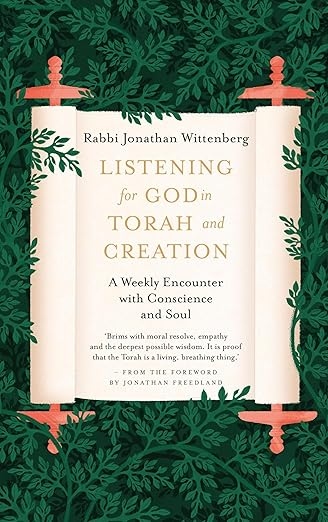Listening for God in Torah and Creation by Rabbi Jonathan Wittenberg
Wittenberg's engaging insights to the Torah; his wisdom and humanity are of benefit to those of us who are not Jews
 Listening for God in Torah and Creation - a weekly encounter with conscience and soul
Listening for God in Torah and Creation - a weekly encounter with conscience and soul
By Rabbi Jonathan Wittenberg
Hodder & Stoughton
ISBN 978-1-529-39583-9
Reviewed by Robert Draycott
This is a 'Desert Island' book, a gem that one could read and re read whilst waiting to be rescued. I found it absolutely fascinating, readable, full of wisdom and insight. Yet it is difficult to review at present, simply because of what is happening in Gaza. My main reason for saying this is because the author - quite correctly, quite properly - often refers to the Holocaust, the losses the sufferings of Jewish people, including his own family. Here is one example: 'Persecutors often begin by 'not knowing' their victims. They make themselves ignorant of their individual identities and stories and treat them only as a group to be sneered at. ....(who) cease to merit consideration as human beings and equals. Under Nazism, Jews first became Untermenschen, sub-human, then vermin.'
The book is a collection of sermons, 'structured according to the Torah readings, which alongside the festivals, define the flow of the Jewish year.' There are 52 sections each with at least one sermon for that section. The opening chapters have 7 sermons. Here is a taste of the first one: 'Talking about God is therefore a dangerous affair. God does not necessarily 'do' what the sacred, but inevitably human, record of Scripture ascribes to him or her. We cannot see or know God as God is.'
This quote illustrates both good advice and also reminds Christian readers that we would generally want to 'go further'. Having said that we would do well to pay serious attention to Wittenberg's scholarship and learning, especially for those who have not studied Hebrew.
This collection was published before the shameful events of 7 October and the ongoing shameful conflict since. I would be fascinated to hear how the author relates these terrible happenings to the Torah, the bedrock of Jewish life. I am confident that he would be worth hearing, that his wisdom and humanity would prove of benefit to those of us who are not Jews.
Here is another extract: 'It's a shameful contradiction that faiths rooted in the oneness and indivisibility of God are brazenly abused to sanction racism and hatred. ......Faiths are especially at risk of giving sanctuary to prejudice. Pulpits are powerful and dangerous places when abused to incite hatred.'
Wisdom and insight on every page, thoroughly recommended.
Robert Draycott is a retired Baptist minister (various pastorates here and in Brazil), and a former chaplain of Eltham College
Baptist Times, 26/07/2024